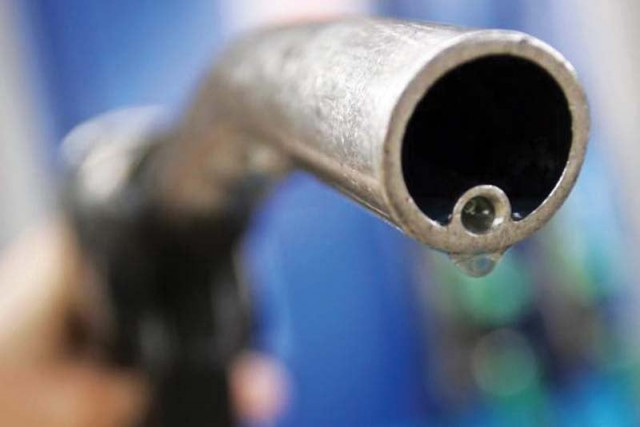Govt denies full benefit of low oil prices
Collects an extra Rs92b from five petroleum products

There are no subsidies on petroleum products after 2008 and the consumers had paid the full price when the crude oil was traded at $150 a barrel. PHOTO: REUTERS
The government has recovered an extra Rs92 billion from consumers of five petroleum products during the last eight months by adjusting upwards the sales tax rates, denying them the full benefit of reduction in prices in the international market.
The consumers of high-speed diesel, which is mainly used in public transport and agriculture sectors, paid most of the additional Rs92 billion that the government collected from July through February 2015-16 by charging sales tax above the standard 17%.
PM announces Rs5 reduction in price of petrol
Despite a 30% reduction in the value of imported petroleum products due to decrease in crude oil prices, the overall tax receipts from petroleum products increased to Rs275.6 billion, up by Rs51.3 billion or 22.9% from July through February, showed data of the Federal Board of Revenue.
The amount does not include petroleum levy receipts, which stood at Rs68 billion in the first half of fiscal year 2015-16.
Out of Rs275 billion tax receipts, an amount of Rs252.6 billion was on account of sales tax collection from all petroleum products, while the remaining Rs23 billion was on account of customs duty.
The Rs252 billion was roughly one-third of the total sales tax collection during this period, highlighting the government’s growing dependence on relatively easy source of revenue generation.
High-speed diesel, light diesel oil, kerosene oil, petrol and high octane were the major petroleum products imported. From these five petroleum products, the government earned Rs182 billion in sales tax.
At 17% standard rate, the collection could have been Rs90 billion, according to the FBR’s statistics, Rs92 billion less than what was actually charged.
The government’s sales tax revenues from just five products grew almost 40% in July-February of this fiscal year, compared to Rs129.3 billion in the comparative period of last fiscal year.
Besides increasing sales tax rates, the government also adjusted customs duty rates, which resulted in a 130% increase in customs duty collection in just eight months of this fiscal year.
First in June 2015, the government increased customs duty on high-speed diesel to 10%, in addition to levying 2% duty on other petroleum products. Then from December 2015, it levied an additional 1% customs duty on all petroleum products, increasing the rate to 3%.
The value of dutiable imports (imports after duty) grew 206% to Rs520 billion from July through February.
However, the steep decline in crude oil prices helped the government save $3.1 billion in just eight months, as petroleum products import bill stood at $5.1 billion.
This shows in order to offset the impact of declining prices, the government has been constantly tinkering with sales tax rates. The revenues from the petroleum products have increased despite the value of dutiable imports decreasing 30%, indicating the extent of additional taxes that the consumers have been paying.
Although, the government has also decreased the price of petroleum products, the decision to only partially pass on the benefits of reduced prices is contrary to the government’s policy of linking the domestic market prices with international market. There are no subsidies on petroleum products after 2008 and the consumers had paid the full price when the crude oil was traded at $150 a barrel.
The government is currently charging Rs29.57 per litre sales tax on high-speed diesel, which comes to 108.7% of the ex-refinery price of the diesel. Diesel consumption is roughly seven times more than the petrol consumption. The ex-refinery price of diesel is Rs27.18 per litre but the consumers are paying Rs71.12 per litre.
Fuel prices may be slashed by 17%
Similarly, the ex-refinery price of petrol is Rs29.51 and after including taxes, petroleum levy and profit margins, the consumers are paying Rs62.70 per litre price. The government is charging a fixed Rs10.40 per litre sales tax on petrol, which comes to 49% of the ex-refinery price, as against the standard rate of 17%.
Published in The Express Tribune, March 29th, 2016.
Like Business on Facebook, follow @TribuneBiz on Twitter to stay informed and join in the conversation.



















COMMENTS
Comments are moderated and generally will be posted if they are on-topic and not abusive.
For more information, please see our Comments FAQ